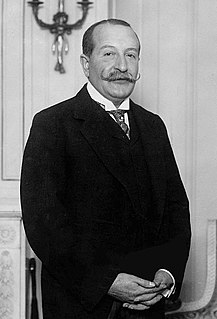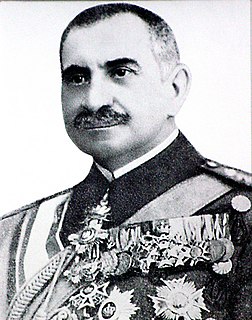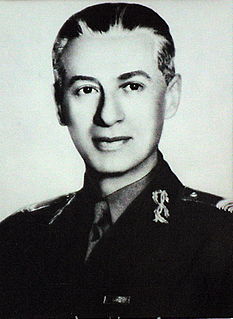 W
WA List of Ministers of Finance of Romania:
 W
WVictor Antonescu was a Minister of Finance between 1935 and 1936 and Minister of Foreign Affairs of Romania from 29 August 1936 until 28 December 1937. In 1946, he was part of the Romanian delegation at the Paris Peace Conference.
 W
WConstantin Argetoianu was a Romanian politician, one of the best-known personalities of interwar Greater Romania, who served as the Prime Minister between 28 September and 23 November 1939. His memoirs, Memorii. Pentru cei de mâine. Amintiri din vremea celor de ieri —a cross section of Romanian society, were made known for the sharp critique of several major figures in Romanian politics.
 W
WConstantin C. Arion was a Romanian politician, affiliated with the National Liberal Party, the Conservative Party and, after 1918, the People's Party. He served two terms as Minister of Religion and Public Instruction, one term as Minister of Agriculture, and another one as Interior Minister before World War I. His career peaked in 1918, when he was Minister of Foreign Affairs.
 W
WAlexandru Averescu was a Romanian marshal, diplomat and populist politician. A Romanian Armed Forces Commander during World War I, he served as Prime Minister of three separate cabinets. He first rose to prominence during the peasants' revolt of 1907, which he helped repress with violence. Credited with engineering the defense of Moldavia in the 1916–1917 Campaign, he built on his popularity to found and lead the successful People's Party, which he brought to power in 1920–1921, with backing from King Ferdinand I and the National Liberal Party (PNL), and with the notable participation of Constantin Argetoianu and Take Ionescu.
 W
WDinu Brătianu, born Constantin I. C. Brătianu, was a Romanian politician who led the National Liberal Party (PNL) starting in 1934.
 W
WIon Constantin Brătianu was one of the major political figures of 19th-century Romania. He was the son of Dincă Brătianu and the younger brother of Dimitrie, as well as the father of Ionel, Dinu, and Vintilă Brătianu. He also was the grandfather of poet Ion Pillat.
 W
WVintilă Ion Constantin Brătianu was a Romanian politician who served as Prime Minister of Romania between 24 November 1927 and 9 November 1928. He and his brothers Ion I. C. Brătianu and Dinu Brătianu were the leaders of the National Liberal Party of Romania, founded by their father, Ion C. Brătianu.
 W
WIon I. Câmpineanu was a Romanian statesman who served as the Minister of Justice from January 27, 1877 to September 23, 1877, Minister of Finance in two terms, from September 23, 1877 to November 25, 1878 and from February 25, 1880 to July 15, 1880, and Minister of Foreign Affairs from November 25, 1878 until July 10, 1879, He was one of the founders and most important members of the National Liberal Party.
 W
WPrince Gheorghe Grigore Cantacuzino, was a Romanian politician and lawyer, one of the leading Conservative Party policymakers. Among his political posts were minister of public instruction in Romania, president of the chamber, and president of the senate. He twice served as the Prime Minister of Romania: between 23 April 1899 and 19 July 1900, and between 4 January 1906 and 24 March 1907. He resigned from office after failing to put down the large-scale peasants' revolt. He was the 20th Romanian politician to serve as PM.
 W
WPetre P. Carp was a Moldavian, later Romanian statesman, political scientist and culture critic, one of the major representatives of Romanian liberal conservatism, and twice the country's Prime Minister. His youth was intertwined with the activity of Junimea club, which he co-founded with critic Titu Maiorescu as a literary society, and then helped transform it into a political club. He left behind a budding career as Junimea's polemicist and cultural journalist, joining the state bureaucracy of the United Principalities, the Romanian diplomatic corps, and ultimately electoral politics. A speaker for aristocratic sentiment and the Romanian gentry, Carp helped create the Conservative Party from the various "White" conservative clubs (1880), but also led a Junimist dissident wing against the Conservative mainstream leaders Lascăr Catargiu and Gheorghe Grigore Cantacuzino. He was a contributor to the Junimea platform Convorbiri Literare, and founder of the newspapers Térra (1868) and Moldova (1915).
 W
WGheorghe Chițu was a Wallachian, later Romanian lawyer, politician, and man of letters, whose activities were mostly centered on the region of Oltenia. The recipient of a classical education, which compensated for his middle-class background and allowed him to study at the University of Vienna, he was also deeply involved in the Wallachian Revolution of 1848 as an early adherent of "Red" liberalism. He became a propagandist and organizer for the National Party, founding Vocea Oltului gazette in 1857. Chițu was confirmed as the United Principalities' first-ever elected provincial mayor, at Craiova, where he also worked as a lawyer and prosecutor. His political radicalism and his participation in the Romanian Freemasonry were nuanced by his defense of the Romanian Orthodox Church against a reduction of its assets. Serving for almost twenty years in the Assembly of Deputies and Senate, he criticized Westernization and championed local political models, including Oltenia's Tudor Vladimirescu. His parallel work as a publicist and publisher resulted in noted collaborations with Constantin D. Aricescu, Bogdan Petriceicu Hasdeu, and Theodor Aman; it also contributed to his being inducted into the Romanian Academy in 1879.
 W
WFlorin Vasile Cîțu is a Romanian politician who served as Prime Minister of Romania between December 2020 and November 2021. Since September 2021 he has been the leader of the National Liberal Party (PNL). After a motion of no-confidence ended his premiership, Cîțu was voted President of the Senate of Romania by the new PSD-PNL-UDMR/RMDSZ coalition in Parliament. Previously, he also served as Minister of Public Finance in both the first and second cabinet of former PNL Prime Minister Ludovic Orban between 2019 and 2020.
 W
WMitiţă Constantinescu was a Romanian economist and liberal politician. He was an advocate of industrialization and a degree of dirigisme.
 W
WEmil Costinescu was a Romanian economist, businessman and politician.
 W
WNicolae Crețulescu was a Wallachian, later Romanian politician and physician. He served two terms as Prime Minister of Romania: from 1862 to 1863, and from 1865 to 1866. He was elected to the Romanian Academy. He was the 3rd president of the Romanian Academy from 1872 to 1873.
 W
WNicolae Dabija was a Romanian general and politician.
 W
WDaniel Dăianu is a Romanian economist, professor, and politician.
 W
WAnca Dana Paliu Dragu is a Romanian economist and politician. She was the former Minister of Public Finance and was the President of the Senate of Romania from 21 December 2020 until 23 November 2021. She is the first woman in the history of the Senate to hold this position.
 W
WAlexandru G. Golescu was a Romanian politician who served as a Prime Minister of Romania in 1870.
 W
WTake or Tache Ionescu was a Romanian centrist politician, journalist, lawyer and diplomat, who also enjoyed reputation as a short story author. Starting his political career as a radical member of the National Liberal Party (PNL), he joined the Conservative Party in 1891, and became noted as a social conservative expressing support for several progressive and nationalist tenets. Ionescu is generally viewed as embodying the rise of middle-class politics inside the early 20th century Kingdom of Romania, and, throughout the period, promoted a project of Balkan alliances while calling for measures to incorporate the Romanian-inhabited Austro-Hungarian regions of Transylvania, Banat and Bukovina. Representing his own faction inside the Conservative Party, he clashed with the group's leadership in 1907–1908, and consequently created and led his own Conservative-Democratic Party.
 W
WIon Lapedatu was finance minister of Romania (1926-1927), Governor of the National Bank of Romania (1944-1945), and honorary member of the Romanian Academy.
 W
WVasile Luca was an Austro-Hungarian-born Romanian and Soviet communist politician, a leading member of the Romanian Communist Party (PCR) from 1945 and until his imprisonment in the 1950s. Noted for his activities in the Ukrainian SSR in 1940–1941, he sided with Ana Pauker during World War II, and returned to Romania to serve as the minister of finance and one of the most recognizable leaders of the Communist regime. Luca's downfall, coming at the end of a conflict with Gheorghe Gheorghiu-Dej, signaled that of Pauker.
 W
WVirgil Traian N. Madgearu was a Romanian economist, sociologist, and left-wing politician, prominent member and main theorist of the Peasants' Party and of its successor, the National Peasants' Party (PNȚ). He had an important activity as an essayist and journalist, being for long a member on the editorial board for the influential Viaţa Românească.
 W
WManea Mănescu was a Romanian communist politician who served as Prime Minister for five years during Nicolae Ceaușescu's Communist regime.
 W
WIuliu Maniu was an Austro-Hungarian-born lawyer and Romanian politician. He was a leader of the National Party of Transylvania and Banat before and after World War I, playing an important role in the Union of Transylvania with Romania.
 W
WGheorghe Manu was a Romanian Army general, artillery inspector and statesman. He served as Prime Minister (1889–1891), Minister of War, Minister of the Interior, President of the Assembly of Deputies, and Mayor of Bucharest.
 W
WAlexandru Marghiloman was a Romanian conservative statesman who served for a short time in 1918 (March–October) as Prime Minister of Romania, and had a decisive role during World War I.
 W
WPetre Mavrogheni also known as Petru Mavrogheni was a Romanian politician who served as the Minister of Foreign Affairs from 11 May until 13 July 1866 and as the Minister of Finance.
 W
WGheorghe G. Mironescu, commonly known as G. G. Mironescu, was a Romanian politician, member of the National Peasants' Party (PNȚ), who served as Prime Minister of Romania for two terms.
 W
WAlexandru Nazare is a Romanian politician, Minister of Finance of Romania between December 2020 and July 2021, senator elected in the 2020 parliamentary elections and the special representative of the Romanian Government for Romania's candidacy for hosting the European Cybersecurity Competence Centre, 2020. Previously in 2012, he held the position of Minister of Transport and Infrastructure and in December 2008, he became the youngest representative of Romania in the European Parliament.
 W
WPaul Niculescu-Mizil was a Romanian communist politician. Joining the Romanian Communist Party due to his background and intellectual aspirations, he was prominent in the agitprop department during Gheorghe Gheorghiu-Dej's rule. Under Nicolae Ceaușescu, he went from handling foreign affairs in the late 1960s to holding ministerial posts in the 1970s to a marginal position in the 1980s. After the regime's collapse in 1989, he spent time in prison before emerging as a vocal defender of the system he had served.
 W
WIoan Oteteleșanu was a Wallachian, later Romanian businessman and politician.
 W
WIoana Maria Petrescu is a Romanian economist who served as the country's Finance Minister between March and December 2014.
 W
WTheodor Rosetti was a Romanian writer, journalist and politician who served as Prime Minister of Romania between 23 March 1888 and 22 March 1889.
 W
WConstantin Sănătescu was a Romanian general and statesman who served as the 44th Prime Minister of Romania after the 23 August 1944 coup, through which Romania left the Axis powers and joined the Allies.
 W
WVictor Slăvescu was a Romanian economist and politician. He was a professor of economics at the Bucharest Academy of Economic Studies and a titular member of the Romanian Academy. He also served as Finance Minister (1934–1935) and Minister of Materiel (1939–1940).
 W
WAlexandru Barbu Știrbei, also rendered Alex. Știrbeĭ, Știrbey, or Știrbeiŭ, was a Wallachian-born Romanian aristocrat, politician, businessman and agriculturalist, the son of Barbu Dimitrie Știrbei, Prince of Wallachia, younger brother of George Barbu Știrbei, and nephew of another Prince, Gheorghe Bibescu. After a short career in the French Army, he returned to the United Principalities and served terms in their Assembly of Deputies, inheriting the fortune left by his father. He established pioneering industries around his manorial estates of Buftea and Dărmănești, and became a guest, and sometime host, of literary meetings held by the political club Junimea.
 W
WPrince Barbu Alexandru Știrbey was 30th Prime Minister of the Kingdom of Romania in 1927. He was the son of Prince Alexandru Știrbey and his wife Princess Maria Ghika-Comănești, and grandson of another Barbu Dimitrie Știrbei, who was Prince of Wallachia and died in 1869. The Știrbey family was one of the more prominent and wealthier boyar (noble) families in Wallachia, and had been so since the 15th century.
 W
WTheodor Dumitru Stolojan is a Romanian politician who was Prime Minister of Romania from September 1991 to November 1992. An economist by training, he was also one of the presidents of the National Liberal Party (PNL) before being the founding leader of the Liberal Democratic Party (PLD) and then the Democratic Liberal Party (PDL). He was a Member of the European Parliament for Romania, representing the Democratic Liberal Party (PDL) and then the National Liberal Party.
 W
WIon Strat was a Moldavian, later Romanian jurist and politician.
 W
WDimitrie Sturdza was a Romanian statesman and author of the late 19th century, and president of the Romanian Academy between 1882 and 1884.
 W
WChristian Tell was a Transylvanian-born Wallachian and Romanian general and politician.
 W
WNicolae Titulescu was a Romanian diplomat, at various times government minister, finance and foreign minister, and for two terms President of the General Assembly of the League of Nations (1930–32).
 W
WDarius Vâlcov is a Romanian politician who served as Minister of Finance, Mayor of Slatina and Senator.
 W
WGeorge D. Vernescu was a Wallachian-born Romanian politician.
 W
WVarujan Vosganian is a Romanian politician, economist, essayist and poet of Armenian origin. Vosganian was Romania's Minister of Economy and Commerce (2006–2008) in the Tăriceanu cabinet and Minister of Economy in the Ponta cabinet (2012–2013). He is the President of The Union of Armenians in Romania and the Prime-vice president of the Union of Writers in Romania (2005–present). His books have been translated into more than 20 languages.